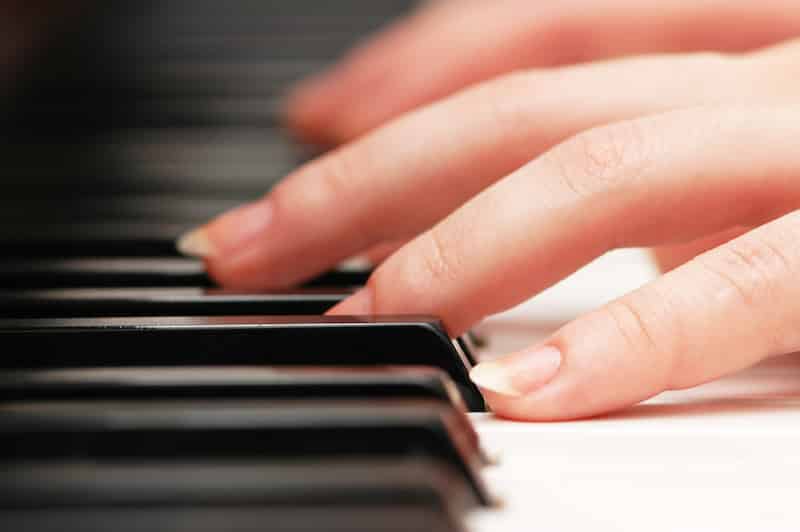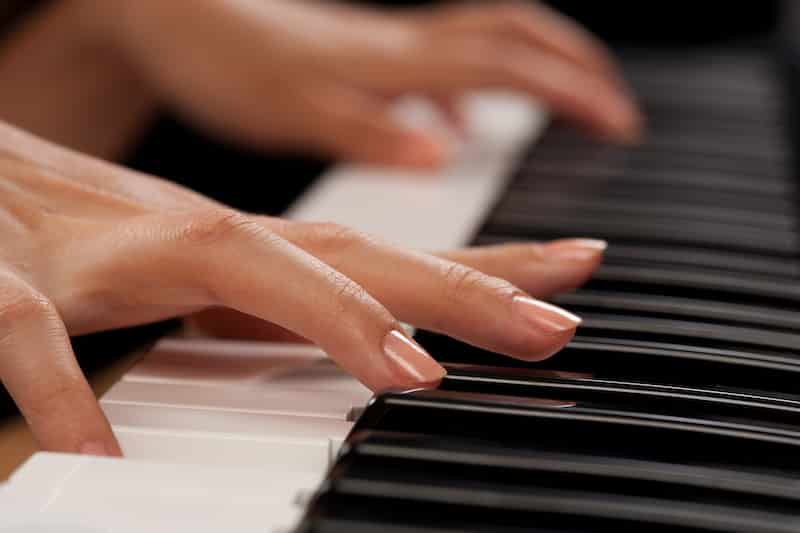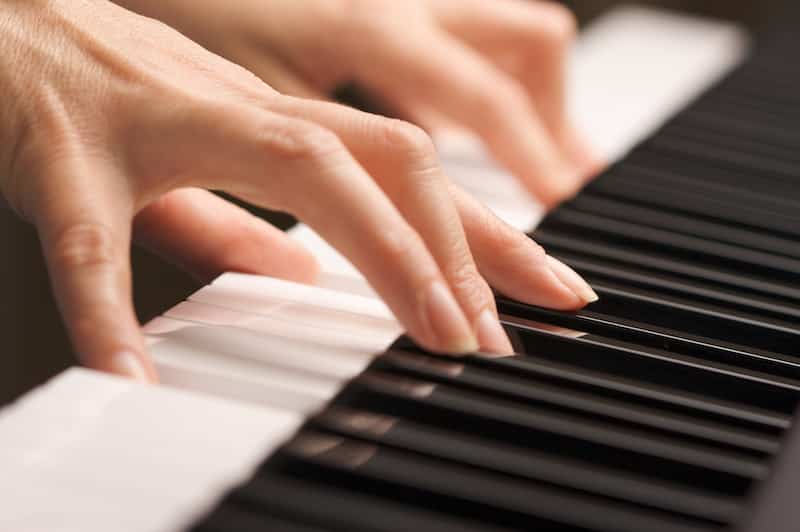Many piano teachers scold their students for having long nails, and they’re not necessarily wrong for doing it. If you play piano, you might wonder can you play piano with long nails? Or are all those teachers right?
Here, we’ll discuss what it’s like for piano players who have long nails and whether short nails or long nails make much of a difference.
The quick answer to can you play piano with long nails is yes, but short nails are definitely better.
However, not all piano players have short nails. Below, we’ll not only cover the benefits of short nails but also give you some tips on how to be a good piano player even if you have long nails.
What’s the Deal with Long Nails and the Piano?

Many people have long nails, but you don’t see many serious piano players with them. Why is that?
Well, there are several reasons why serious piano players prefer short nails, but the fast answer is that long nails have too much of a negative effect on their playing.
How Do Long Nails Negatively Affect Piano Playing?
Long nails might look great, but having them can be a real pain for pianists, especially if you’re playing complex pieces that require intense and quick finger movement.
With long nails, you might notice that your nails make a knocking noise every time you move your fingers to a new key. While an audience might not notice these noises, you definitely will as the pianist. They can be distracting, throwing off your timing for the piece.
Also, long nails often get caught on the edges of the piano keys, blocking your fingers from moving to their correct positions. If you paid for fake nails, know that you’re more likely to break them playing piano than many other instruments.
To compensate for these issues, piano players with long nails often play straight-fingered, meaning they don’t arch or bend their fingers much when playing. While this allows them to play a bit better with long nails, it heavily restricts their finger flexibility and mobility.
As a result of long nails, a pianist’s playing skill often seems to suffer.
Why Would Anyone Want Long Nails if They Play Piano?
You might wonder why anyone would even want long nails if they’re learning the piano, but you have to remember that many people have lives outside of playing this amazing instrument.
They may play another instrument like a classical guitar which requires long nails, or just bought a fab set of expensive fake nails that they don’t want to part with.
Whatever the reason may be, you may want to play piano with long nails, and that’s OK! However, you should understand that your nails will make playing the piano harder, regardless of how good they look.
Why Are Short Nails Better for Piano?

The bottom line is that short nails are just better for piano. With short nails, you won’t encounter most, if any, of the problems outlined above.
Maintaining the correct finger posture is key to playing the piano with the speed, passion, and versatility the instrument deserves. It becomes much more challenging for your finger to move as naturally and skillfully as you can with long nails.
Also, short nails simply bring you closer to the piano as a player and partner of the instrument. Every piano is different, and you need the have as much sensitivity in your fingers as possible to figure out the best way to play yours.
Keeping your nails short is key to “getting to know” your instrument in the early phases of owning or regularly playing a single piano.
How to Keep Long Nails and Play Piano
If you’re in despair about your long nails, don’t worry. You can still play piano with long nails!
While it is harder for your pads to touch the keys with longer nails, you can train yourself to overcome this obstacle. By experimenting with how much pressure you apply to each key and straightening your fingers slightly, you can compensate for long nails.
Additionally, you need to get used to how the edges of your nails graze the keys, especially as you move your fingers to other keys. Check how curved your fingers are as you play. Too curved, and your nails will continue to knock against the keys annoyingly.
Also, fake nails may feel slightly different from natural nails or other faux-nail materials. Play around with different nails to strike the best balance between playing ability and your preferred appearance.
As long as you’re prepared for it to be harder, you can keep your long nails and still improve your skills at the piano!
Should Piano Players Cut Their Nails?
The answer to this question is really all about the individual piano player. Do you value your nails above the piano? Is there some way to compromise having long nails with your piano playing?
Asking yourself these questions first will determine how important your long nails are in relation to your piano playing.
While it might be hard to hear, most serious piano players have short nails for a reason.
In our opinion, if you’re truly serious about playing the piano and want to pursue a career out of it, you should probably cut your nails like your teacher has been asking.
Piano Students and Long Nails

Many piano teachers have issues with students who refuse to trim their nails. Whether it’s a childish bad habit or more of an aesthetic choice, you might wonder if you should allow them to continue playing with long nails.
Well, the answer is a bit complicated. While nails can be an important expression of a child’s identity, they also get in the way of the most efficient learning practices.
If you can, speak with the child’s parents or guardian to see what’s best for them. If you think the child can manage it and they’re driven enough, it might be better to let them keep their nails.
However, it’s important to tell your students that keeping short nails is generally best practice. Making exceptions is any teacher’s prerogative, but students should also be aware of what’s the most conducive to learning and their ability to improve.
As a teacher, if you want to maintain a policy of short nails with all of your students, that’s entirely your choice to do so.
Conclusion
We hope this article answered most, if not all, of the questions you had about playing piano with long nails. Let us know below if we missed anything!
While it’s totally possible to play with long nails and even be a professional pianist, it’s much easier to play with shorter nails. You get more contact with the instrument through the pads of your fingers, and you’re able to move efficiently without worrying about knocking keys.
However, just like pianos, every pianist is unique! If you want to play the piano with long nails, no one should stop you. Maybe you’ll prove them all wrong and become the next Mozart with a manicure!

